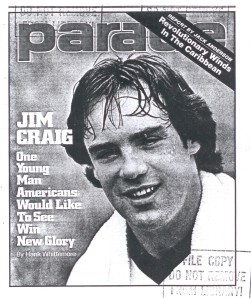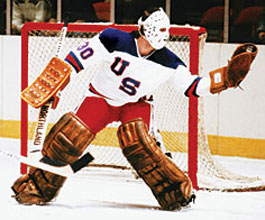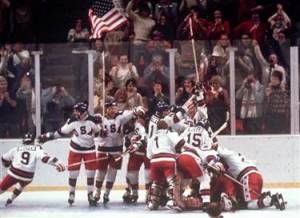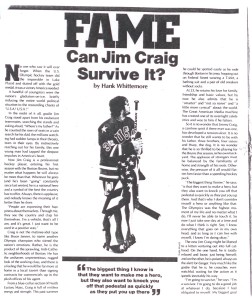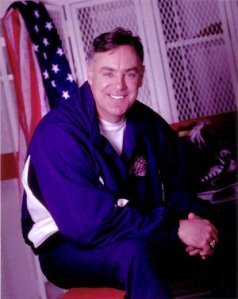JIM CRAIG:
One Young Man Americans Would Like to See Win New Glory
Thirty years ago I interviewed Jim Craig in Boston some months after he had led the U.S. hockey team that beat the supposedly unbeatable Soviet Union in the 1980 Olympics. In those days Craig was a national hero; today he’s a national legend. And he’s been up there in Vancouver rooting with the rest of us for Team USA.
Re-reading my article, I marvel at the wisdom Jim Craig possessed even then. He’s the real deal! Here’s the full text of what I wrote:
PARADE
September 21, 1980
By Hank Whittemore
No one who saw it will ever forget. When the U.S. Olympic hockey team did the impossible in Lake Placid and skated off with the gold medal, it was a victory America needed.
A handful of youngsters were the nation’s gladiators-on-ice, briefly reducing the entire- world political situation to the resounding chants of U.S.A.! U.S.A.!”
In the midst of it all, goalie Jim Craig stood apart from his exuberant teammates, searching the stands and asking aloud, “Where’s my father?” As he counted the rows of seats in a vain search for his dad, the millions watching had sudden lumps in their throats, tears in their eyes. By instinctively reaching out for his family, this one young man had tapped the deepest impulses in America’s heart.
[NOTE: Jim has a great personal website]
Now Jim Craig is a professional hockey player, entering his first season with the Boston Bruins, but no matter what happens he will always be more than that. Wherever he goes (and he’s been “going” constantly since last winter), he is a national hero and a symbol of the best the country has to offer. Always, there is applause; and nobody knows the meaning of it better than he does:
“People are expressing their happiness about themselves. Through me, they see the country and clap for themselves. I’m a vehicle, that’s all I am, and it’s great. I just want to be used in a positive way.”
Craig is not the matinee-idol type like Bruce Jenner to name another Olympic champion who stirred the nation’s emotions. Rather, he is the product of the sprawling, Irish-Catholic neighborhoods of Boston. He has the unshaven, unpretentious, rugged look of the working class, and there is a feeling that he would be far more at home in a local tavern than signing contracts for commercials up in the plush offices of his agent.
From a blue-collar section of North Easton, Mass., Craig is full of restless energy and strength. This past summer he could be spotted easily as he rode through Boston in his jeep, hopping out on Federal Street wearing a T-shirt, a bathing suit and a pair of old sneakers without socks.
At 23, he retains his love for family, friendship and basic values, but by now he also admits that he is “smarter” and “not so naive” and “a little more cynical” about the world. The Great American Media machine has created one of its overnight celebrities and woe to him if he falters.
So it is no wonder that Jimmy Craig, a carefree spirit if there ever was one, has developed a tension ulcer. It is no wonder that he still wants to be with his father, three brothers, four sisters and Huey, the dog. It is no wonder that he is so thrilled to be playing for the Bruins this season, in his own back yard. The applause of strangers must be balanced by the familiarity of home and strength of his roots. Otherwise, the pressure of it all would flatten him faster than a speeding hockey puck.
“The biggest thing I know,” he says, “is that they want to make a hero, but they also want to knock you off that pedestal as quickly as they put you up there. And that’s why I don’t consider myself a hero or anything like that. The Olympics was the highest moment of my life and no matter what I do, I’ll never be able to touch it. So now I just take one day at a time and do what I think is right. See, I know everything that goes on in my own head, and as long as I can live with myself, I know I’m doing okay.”
The new Jim Craig might be likened to a kitten venturing out into full cathood. On the one hand he is totally relaxed and loose, just being himself; and on the other, he is poised, always on the alert for danger. Very much like the goalie that he is, he crouches, ever- watchful, waiting for the action as it speeds inevitably his way.
“I’m going to survive.” he says. “I’m a survivor. I’m going to do a good job at whatever I do, because I feel obligated to myself. My biggest goal now is being a professional hockey player and doing well for the Bruins. I’ll be a big disappointment to myself if I don’t play well this season.
“Fortunately I simplify everything as much as possible. I don’t put any more pressure on me than I have to. If I walked around trying to act a certain way all the time, I’d be a basket case. You can fool everyone in the world, but not yourself.”
After Lake Placid, Craig was catapulted into a whirlwind: lunch at the White House, appearances on television, parades, speeches, airplane crowds and more crowds. In Chicago, he walked into his hotel room and found a nude woman lying in his bed.
“Please leave,” he told her, having no need for such favors, and besides, the cat had reared up its back: “You never know, it could have been a setup.”
Craig also joined the Atlanta Flames hockey team and tried to help save their franchise. Under tremendous stress he played four games, winning one, losing one and tying two. Despite his numerous promotional appearances for the Flames, and a burst of new life at the box office, the team was sold to Calgary and Craig wound up with his tension ulcer. In June, he was traded to the Bruins and went home.
“It couldn’t be better,” he says with a look of wonder in his watery blue eyes. “You know that phrase, ‘You were made to be there’? Well, I’m made to be here.” As if life were a storybook, he will be playing with the team he rooted for as a boy; and his boyhood idol, Gerry Cheevers, retired as goaltender and became the Bruin coach.
“Unbelievable.” Craig says with a smile.
Until the summer, Craig still lived in the house in Easton, where he had grown up as the sixth of Donald and Margaret Craig’s eight children. Now he has his own apartment in Boston, not far away; but the roots of his Irish- Catholic background are still his main source of nourishment.
“I love my family,” he says, and it still amazes him that people enjoy hearing him express that simple, strong emotion, as if it were unusual.
“My father never made more than about $13,000 a year when I was growing up, but I consider myself fortunate. Dad was a food director at Dean Junior College up in Franklin for 28 years. He was like a father to those kids, too. He worked seven days a week and really enjoyed it.
“The amazing part, though, was that he’d come home after a long day and always have time for us. He wouldn’t grouch and say, ‘Leave me alone.’ Never. Instead, he’d go out and hit balls to us and so forth,
“I feel very lucky that I got to thank my old man before it was too late. These days there are so many kids who want to give their old man a big hug and a kiss, but they can’t. Fathers think that if they send ’em to the best prep schools or give ‘em the car or money, they’ve done a good job. ‘So why doesn’t my son love me?’ they ask.
“Why not? Because that’s not what the kid is looking for. And if he doesn’t get it, he’ll miss it when he’s older. In my opinion, if a kid doesn’t have a relationship with his father before he’s 16, he won’t have one later on. The giving and taking has to start before that age or it never will. By then, there are too many gaps to fill.”
Craig’s mother, who died of bone cancer in 1977, was an even greater influence on him. “It was as if she was a big bear and we were all her cubs.” He recalls. “She was a great, great lady, and all I have is fond memories. My parents played typical roles – Dad going out to work, Mom taking care of us kids and giving the discipline. When she died, my father had to switch roles suddenly and do a little bit of everything.”
When Jim Craig was real small, he would go down to the frozen ponds on a narrow section filled with trees, and while the older boys played hockey, he would skate on a narrow section filled with trees. “It was like an obstacle course,” he says. “There was just enough ice around the trees to skate in-between.”
From then on, the obstacle courses grew tougher, but Craig seemed to glide through them all with hard work, strength, instinct and grand success. He played goalie in high school and his team racked up 53 wins, three losses and a tie. In his sophomore year at Boston University, the Flames drafted him, meaning that they would “own” his services after college.
Meanwhile, he led the 1978 B.U. team that won the National Collegiate title. After graduation, he postponed the professional career and went off to Moscow with the U. S. 1979 national team for the World Games.
“I hated Moscow,” he says. “It was just awful. You get off the plane and they have guys with machine guns putting you on a bus. They had KGB agents following us everywhere we went. A very scary experience. On the ride home, we sang ‘God Bless America.’”
Then came the Olympic triumph at Lake Placid, followed by the whirlwind, the Flames and the call back to Boston. Craig signed a contract with Coca Cola (he received $35,000 for doing a one-shot TV commercial), committing himself to make 10 appearances around the country. Under the guidance of his agent, Bob Murray, he has accepted dozens of invitations to appear at charity events, and to give speeches, in nearly every state.
“We also turn down a lot of things,” Craig says. “Everybody wants a piece of me, but I want to do only quality things. I feel a moral obligation to certain friends and charities, but I’m going slow. I try to spend three days a week with my family and keep my feet on the ground.
“I date girls here and there, but I don’t want to be tied down yet. I just want to go out and have fun, with no strings attached. No commitments. Just friends.”
Once again, it is the instinct of the cat who is suddenly out in the world, feeling his way along and trying to learn while not getting trapped. In his quest to be an award-winning .pro hockey player, Craig has vowed to re main unmarried for at least five more years.
In this new, high-pressured world he has entered, Craig is still speeding through the obstacle course: “People tell me, ‘Oh, Jimmy, you gotta be careful. They’re all using you.’ Hey, I’m just being me. And if anybody’s using me, well, I’m using them too. What I’m trying to do is just learn from people.
“I’m not an intellectual, but I have lots of common sense, I can get fooled once, but I won’t make the same mistake again. If somebody is my friend, he’s my friend. If he’s not, he’s not. And I’ll tell him right up front.
“But do you know how lucky I am? To be able to travel and meet so many people? Their character comes out without them even knowing it. You can see the character in a person, or the lack of it, right away. And when I meet a guy with experience. I’ll sit there and just listen.”
That is Craig’s way of educating himself, not through books but from life itself. Long before he was sharing platforms with governors and movie stars, he was studying people in all walks of life. He did so when he moved furniture, landscaped gardens and painted houses. He learned from the well-to-do when he caddied at Thorny Lea Golf Club (where he now has a free membership), and from dock workers when he packed groceries in Fernandes Supermarket.
Over the summer, however, Jim Craig went to California by himself, with no one. For nine days, he stayed in a house without a telephone. Slowly, gradually, he began “getting mentally ready” for the Bruins.
From now on, Boston will claim him as its own; but a sure bet is that America will not forget him and the other boys of winter for a long, long time.
—
